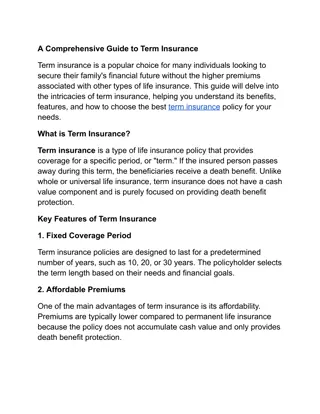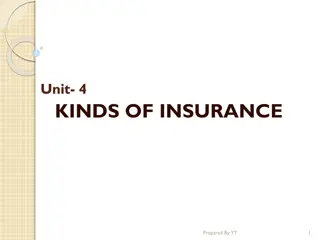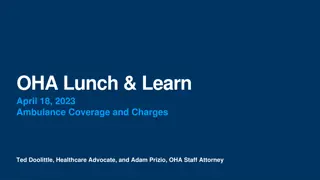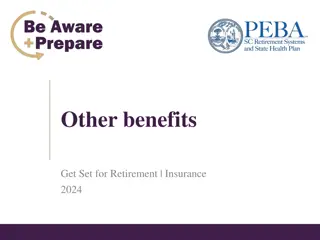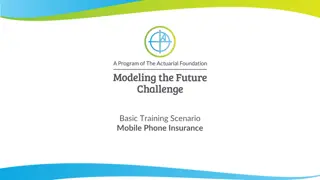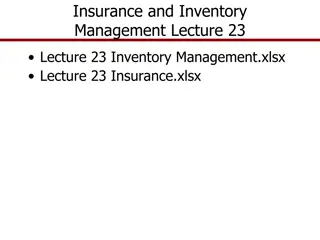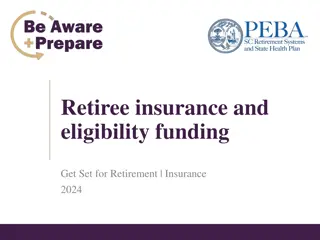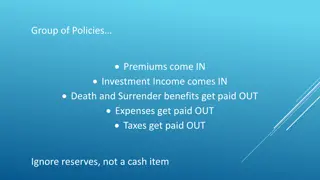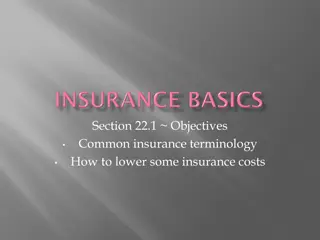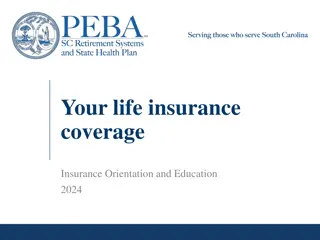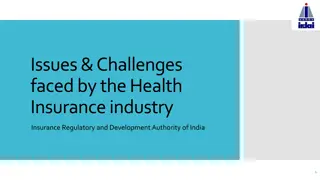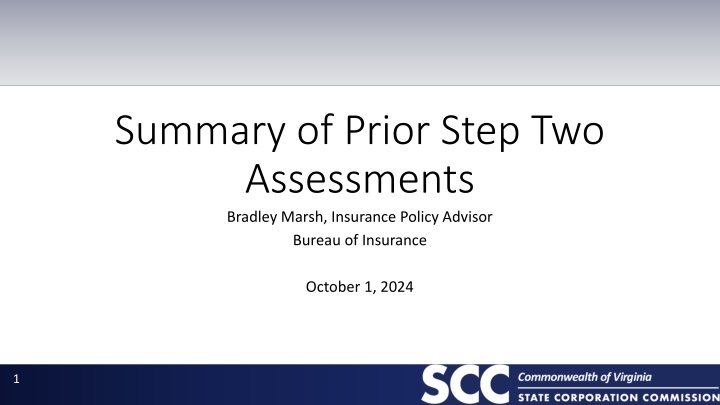
Summary of Insurance Policy Mandates Impact on Premiums
Proposed mandates HB 477 (2022) and HB 1918/SB 1157 (2023) aim to impact insurance policy costs and coverage for prostate cancer screening and audio-only telehealth services. HB 477 prohibits cost-sharing for PSA tests, potentially increasing premiums, while HB 1918/SB 1157 require coverage of audio-only telehealth services for mental health interventions. The expected impact on premiums and market segments is analyzed, with recommendations provided on how to address these mandates within the insurance policy framework.
Download Presentation

Please find below an Image/Link to download the presentation.
The content on the website is provided AS IS for your information and personal use only. It may not be sold, licensed, or shared on other websites without obtaining consent from the author. If you encounter any issues during the download, it is possible that the publisher has removed the file from their server.
You are allowed to download the files provided on this website for personal or commercial use, subject to the condition that they are used lawfully. All files are the property of their respective owners.
The content on the website is provided AS IS for your information and personal use only. It may not be sold, licensed, or shared on other websites without obtaining consent from the author.
E N D
Presentation Transcript
Summary of Prior Step Two Assessments Bradley Marsh, Insurance Policy Advisor Bureau of Insurance October 1, 2024 1
HB 477 (2022) Prostate cancer screening cost sharing
HB 477 (2022): Bill summary This proposed mandate would prohibit cost-sharing on the currently mandated prostate cancer screening benefit of one prostate-specific antigen (PSA) test in a 12-month period to: persons aged 50 and over; and persons aged 40 and over who are at high risk for prostate cancer. This would result in members paying nothing out of pocket at the time of service, but premiums for all members (even those who do not utilize this service) may increase.
HB 477 (2022): Expected impact Impact on premiums is expected to be around 4.6 cents per member per month(PMPM). Small Group Market $0.039 $0.007 $0.046 Large Group Market $0.037 $0.006 $0.043 Individual Market 50 years and above High Risk 40-49 years Total $0.039 $0.007 $0.046 Based on the current cost-share PMPM, the total costs shifted by market segment are estimated to be: $205K for the individual market; $160K for the small group market; and $541K for the large group market. Because HB 477 addresses cost-sharing for an existing benefit, it would not be considered a mandate under federal law and would not be subject to defrayal.
HB 477 (2022): HIRC options Recommend HB 477 in its current form. Because it is a cost-sharing mandate, it would not be subject to defrayal. Because it would not be subject to defrayal, it would apply to all markets, including all QHPs. Recommend HB 477 with changes. The EHB benchmark plan does not set cost-sharing policies, so this mandate is not appropriate for inclusion in the EHB benchmark review. Take no action related to this proposed mandate or consider it in some other manner.
HB 1918 (2023)/SB 1157 (2023) Audio-only telehealth coverage
HB 1918 (2023)/SB 1157 (2023): Bill summary Both proposed mandates would require coverage of audio-only telehealth services, which are currently excluded from the mandate to cover telehealth services. Audio-only telehealth services are counseling interventions designed to remediate mental, emotional, or behavioral disorders by a mental health professional delivered to a patient via audio-only means when no other means are available. HB 1918 does not establish a reimbursement payment standard. SB 1157 requires audio-only telehealth services to be reimbursed at the same payment rate as a face-to-face visit.
HB 1918 (2023)/SB 1157 (2023): Expected impact HB 1918 s impact on premiums is expected to be around 2.8 cents PMPM. SB 1157 s impact on premiums is expected to be around 10 cents PMPM. Small Group Market $0.028 $0.105 Large Group Market $0.027 $0.099 Individual Market HB 1918 (2023 SB 1157 (2023) $0.028 $0.105 Because these bills create a separate definition for audio-only telehealth services that includes services not included in the definition of telemedicine services, CMS indicated that the proposals under HB 1918 and SB 1157 could be considered in addition to EHB .
HB 1918 (2023)/SB 1157 (2023): Expected impact (cont.) HB 1918 - Based on the current cost of coverage for members with audio- only coverage, the costs of expanding that coverage to all enrolled individuals are estimated to be: $128K for the individual market; $100K for the small group market; and $338K for the large group market. SB 1157 - Based on expanding coverage of audio-only telehealth to all enrolled individuals and reimbursing those services on par with other telemedicine, the costs of this mandate are estimated to be: $471K for the individual market; $368K for the small group market; and $1.3M for the large group market.
HB 1918 (2023): HIRC options Recommend HB 1918 in the current form, which would not apply to QHPs and not be subject to defrayal. Bill could have other fiscal impacts. Recommend HB 1918 with revisions so that audio-only telehealth services are covered to the same extent as telemedicine services delivered by other methods. This would not be considered in addition to EHB and would not be subject to defrayal. Because it would not be subject to defrayal, it would apply to all markets, including all QHPs. Recommend HB 1918 be passed with language exempting the mandate from Va. Code 38.2-6506(A)(1), which would apply to QHPs. Virginia would be required to make defrayal payments to QHPs for the cost of the mandated coverage. Recommend the proposed mandate for audio-only telehealth coverage under HB 1918 be evaluated as a part of the current EHB benchmark review. Take no action related to this proposed mandate or consider it in some other manner.
SB 1157 (2023): HIRC options Recommend SB 1157 in the current form, which would not apply to QHPs and not be subject to defrayal. Bill could have other fiscal impacts. Recommend SB 1157 with revisions so that audio-only telehealth services are covered to the same extent as telemedicine services delivered by other methods. This would not be considered in addition to EHB and would not be subject to defrayal. Because it would not be subject to defrayal, it would apply to all markets, including all QHPs. Recommend SB 1157 be passed with language exempting the mandate from Va. Code 38.2-6506(A)(1), which would apply to QHPs. Virginia would be required to make defrayal payments to QHPs for the cost of the mandated coverage. Recommend the proposed mandate for audio-only telehealth coverage under SB 1157 be evaluated as a part of the current EHB benchmark review. Take no action related to this proposed mandate or consider it in some other manner.
HB 2206 (2023) Proton radiation therapy coverage
HB 2206 (2023): Bill summary This proposed mandate would require that a health carrier consider as a sufficient standard of clinical evidence to justify coverage of proton therapy coverage either the fact that proton radiation therapy is covered by Medicare, Medicaid, or any other governmental health coverage; or a recommendation of proton radiation therapy by a patient's treating physician or radiation oncologist.
HB 2206 (2023): Expected impact Impact on premiums is expected to be around 5.5 cents PMPM. Individual Market Small Group Market Large Group Market $0.055 $0.055 $0.052 Based on carrier reporting, the costs of this mandate are estimated to be: $250K for the individual market; $195K for the small group market; and $659K for the large group market. Because this mandate is considered to be in addition to EHB, per 38.2-6506(A)(1) of the Code of Virginia, QHPs are not required to provide these benefits and no defrayal is required. If the mandate were imposed on QHPs, Virginia would be required to defray costs in the individual market.
HB 2206 (2023): HIRC options Recommend HB 2206 in the current form, which would not apply to QHPs and not be subject to defrayal. Bill could have other fiscal impacts. Recommend HB 2206 be passed with language exempting the mandate from Va. Code 38.2-6506(A)(1), which would apply to QHPs. Virginia would be required to make defrayal payments to QHPs for the cost of the mandated coverage. Recommend the proposed mandate for proton radiation therapy coverage under HB 2206 be evaluated as a part of the current EHB Benchmark review. Take no action related to this proposed mandate or consider it in some other manner.




